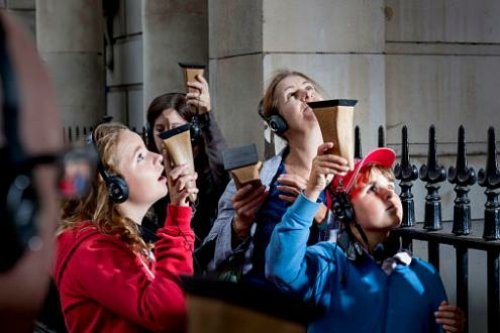Data and digitalisation
Our researchers are utilising deep tech such as quantum, AI, biotechnology and advanced materials to deliver real-world solutions to the biggest societal, environmental and technological challenges that we face.
Research impact case studies
-
 Theatre and technology combine to recreate a lost palace
A multi-award winning heritage tour is transforming how museums help audiences interpret and enjoy heritage sites, using the perfect marriage of theatre and technology to create an immersive experience of history where it happened, without visitors once looking at a screen.
Theatre and technology combine to recreate a lost palace
A multi-award winning heritage tour is transforming how museums help audiences interpret and enjoy heritage sites, using the perfect marriage of theatre and technology to create an immersive experience of history where it happened, without visitors once looking at a screen. -
 Alexa - how does research from Bristol help you work?
Research initiated at Bristol is powering the rapidly expanding market in voice processing for devices such as smart speakers.
Alexa - how does research from Bristol help you work?
Research initiated at Bristol is powering the rapidly expanding market in voice processing for devices such as smart speakers. -
 Shaping the future of 5G
Pioneering research into 5G software and hardware technologies by the University has accelerated the understanding and development of 5G networks in the UK.
Shaping the future of 5G
Pioneering research into 5G software and hardware technologies by the University has accelerated the understanding and development of 5G networks in the UK. -
 Isambard - the world's first production supercomputer based on mobile processor technology
Bristol’s Isambard project has opened up the high-performance computing market by using technology originally designed for mobile devices to build faster, cheaper supercomputers that are now being used to answer important scientific questions.
Isambard - the world's first production supercomputer based on mobile processor technology
Bristol’s Isambard project has opened up the high-performance computing market by using technology originally designed for mobile devices to build faster, cheaper supercomputers that are now being used to answer important scientific questions. -
 Improving the accuracy of evidence-based decision making
The University has developed and disseminated new statistical modelling methods that help policy making organisations answer important questions.
Improving the accuracy of evidence-based decision making
The University has developed and disseminated new statistical modelling methods that help policy making organisations answer important questions. -
 Innovative chain technology saves energy, improves performance and wins cycling gold medals
Work at the University of Bristol has helped to develop innovations in drive chain technology that have achieved a 50% energy saving in industrial settings and delivered improvements in power transmission that have been adopted by the Team GB Olympic Cycling Team.
Innovative chain technology saves energy, improves performance and wins cycling gold medals
Work at the University of Bristol has helped to develop innovations in drive chain technology that have achieved a 50% energy saving in industrial settings and delivered improvements in power transmission that have been adopted by the Team GB Olympic Cycling Team.